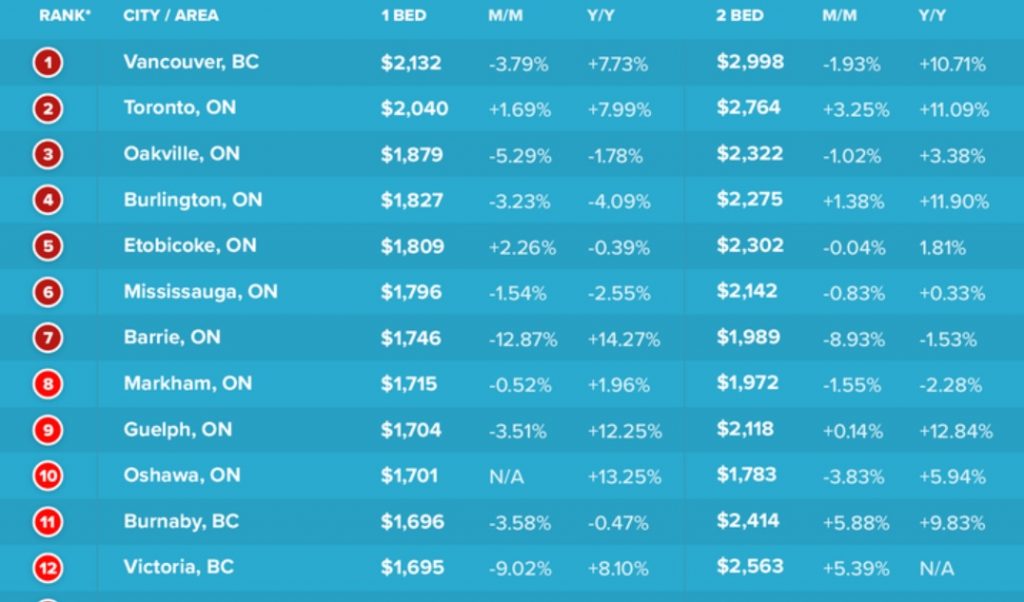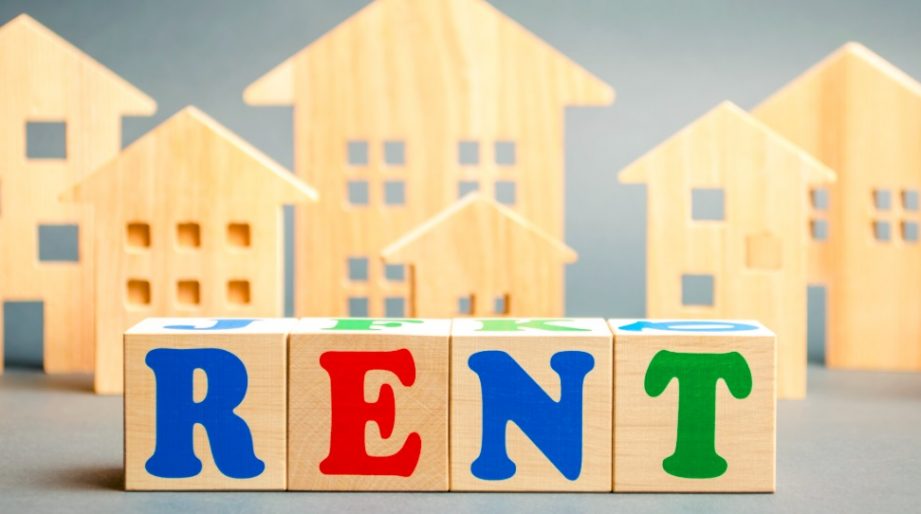Rents will continue to rise in most Canadian cities in 2022, according to the latest projections from Bullpen Research & Consulting and Rentals.ca. The forecast calls for average rents in Toronto to bounce back 11 per cent next year, while Mississauga will see a seven per cent rise by December 2022. The 11 per cent projected increase for Toronto would take average rents up to $2,495—a rise similar to what we saw in 2021 following a year of major declines.
Meanwhile in Vancouver, average rents will likely increase by six per cent overall, with Montreal expected to post an annual increase of five per cent.
“The forecast prepared by Bullpen and Rentals.ca for 2022 sees continued growth in the rental market following the unprecedented declines experienced from April 2020 to April 2021,” said Ben Myers, president of Bullpen Research & Consulting. “Despite the continued upward trend next year, Toronto, Mississauga, Montreal and Calgary are expected to finish next year below their peak rent levels from late 2019 and early 2020.”
While this reflects a positive outlook for the industry, the analysts point out that forecasting is “a tricky business” due to the everchanging landscape of new government regulations affecting supply, immigration affecting demand, and the COVID-19 omicron variant creating more uncertainty around the world.
Digging into the data
 The average monthly rent for all Canadian properties listed on Rentals.ca in November was $1,817—up 3.6 per cent year over year and up monthly by one per cent. This marks the seventh straight month of rent increases since April when average rents hit $1,675, following a year of COVID-19 pandemic-induced declining rents.
The average monthly rent for all Canadian properties listed on Rentals.ca in November was $1,817—up 3.6 per cent year over year and up monthly by one per cent. This marks the seventh straight month of rent increases since April when average rents hit $1,675, following a year of COVID-19 pandemic-induced declining rents.
The rental market in Canada is returning to levels seen at the start of 2020 but remains $137 below the peak rent of $1,954 in September 2019.
In terms of specific markets, Toronto finished second on the list of 35 cities for average monthly rent in November for a one-bedroom at $2,040 and for a two-bedroom at $2,764. Year over year, average monthly rent in November for a one-bedroom in Toronto was up eight per cent and up 11 per cent for a two-bedroom. Month over month, average rent in Toronto was up 1.7 per cent for a one-bedroom and up 3.3 per cent for a two-bedroom.
Oakville came in third on the list for average monthly rent in November for a one-bedroom home at $1,879 and fifth for average monthly rent for a two-bedroom at $2,322.
Year over year, average monthly rent in November for a one-bedroom in Oakville was down 1.8 per cent and up 3.4 per cent for a two-bedroom. Month over month, average rent in Oakville was down 5.3 per cent for a one-bedroom and down one per cent for a two-bedroom.
Burlington finished fourth for average monthly rent in November for a one-bedroom home at $1,827 and seventh for average monthly rent for a two-bedroom at $2,275.
In Vancouver, average rent for all property types on Rentals.ca rose 12 per cent year over year to $2,492 in November. Annual average rent fell last year by 12 per cent in Vancouver to $2,216 in November 2020.
Montreal remains a bright spot for landlords in Canada, with rents rising annually by one per cent in November to $1,689, after also rising year over year by three per cent to $1,668 in November 2020.
Calgary’s average annual rent was up by four per cent to $1,438 in November, but rents did not change significantly on an annual basis in November 2020, with the average listing available for $1,379.
The average rent in Mississauga increased year over year by two per cent to $2,125 in November, after a 13 per cent annual decline to $2,088 in November 2020.
Unit types and sizes
Most bedroom types experienced annual increases in average rent in November. But with many Canadians continuing to work from home, at least part of the time, larger units experienced stronger annual increases in average rent. Some tenants used their “commuting” money toward higher rent for the extra workspace.
Also, demand for luxury rental homes helped cause a 15 per cent annual increase in average rents for six-bedroom units. Average annual rents in November for five-bedroom units, four-bedroom units and three-bedroom units were up seven per cent, nine per cent and six per cent respectively.
One-bedroom units were the only bedroom type to experience an annual decline in average rent at -1 per cent, while two-bedroom units were up $5 on average from one year ago. During the heart of the pandemic lockdowns in November 2020, all bedroom types experienced annual declines, except six-bedroom units, which increased five per cent.
Other takeaways from the report:
- The average rent for single-family homes was up 14 per cent annually in November, and has already moved higher than November 2019 levels, showing a strong recovery from the pandemic. The average rent for townhouses was up 16 per cent year over year in November.
- Condo apartments’ average rent rose eight per cent in November after experiencing the largest annual decline in average rent at 19 per cent last year. The recovery has not been as strong for condos as single-family homes and townhouses.
- In the fourth quarter so far (October and November only), the average rent in British Columbia was the highest in Canada at $2,182, followed by Ontario at $2,090 and Nova Scotia at $1,825. Next were: Quebec ($1,667); Manitoba ($1,361); Alberta ($1,235); Saskatchewan ($1,011) and Newfoundland and Labrador ($977).
Visit www.rentals.ca for more info.







